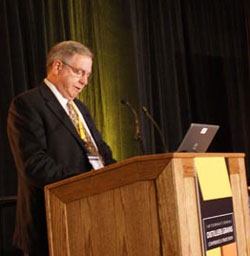A plan to reduce California’s greenhouse gas emissions is expected to be a boon for biodiesel and solar in the state.
 This story from Biodiesel Magazine says the California Air Resources Board has recently unveiled its Proposed Scoping Plan to reduce those emissions to 1990 levels by 2020 and is set to approve the final version in December:
This story from Biodiesel Magazine says the California Air Resources Board has recently unveiled its Proposed Scoping Plan to reduce those emissions to 1990 levels by 2020 and is set to approve the final version in December:
The principle of the plan is to include a variety of strategies to reduce emissions, including a solar initiative and a range of regulations meant to reduce emissions from trucks and ships docked in state ports. The plan also includes a cap-and-trade GHG emissions reduction program which will be linked to the Western Climate Initiative to create a regional market system for carbon emissions.
The plan, which may be implemented as early as 2009, could provide a significant boost for biodiesel demand, particularly for biodiesel produced in-state through the use of sustainable feedstocks. Joe Gershen, vice president of marketing for California’s Tellurian Biodiesel Inc., said state officials are “pretty bullish” on the use of renewable diesel to reduce carbon dioxide emissions. The only “renewable” diesel that is widely available now is biodiesel, so it can be assumed that greater percentage mandates for renewable diesel would equal more demand for biodiesel.
You can read the Proposed Scoping Plan at www.arb.ca.gov.



 A new pilot plant that broke ground in Tennessee last week will be testing the use of switchgrass as a feedstock for cellulosic ethanol.
A new pilot plant that broke ground in Tennessee last week will be testing the use of switchgrass as a feedstock for cellulosic ethanol. Earlier in the day, Governor Bredesen participated in the state’s first-ever Summit on Clean Energy Technology in Knoxville. “When it comes to facing the challenges of the future, Tennessee isn’t just talking the talk about clean energy technology, we’re walking the walk, rolling up our sleeves and getting to work,” said Bredesen. “The bottom line is that this plant and this partnership are going to do a lot of good for Tennessee’s future.”
Earlier in the day, Governor Bredesen participated in the state’s first-ever Summit on Clean Energy Technology in Knoxville. “When it comes to facing the challenges of the future, Tennessee isn’t just talking the talk about clean energy technology, we’re walking the walk, rolling up our sleeves and getting to work,” said Bredesen. “The bottom line is that this plant and this partnership are going to do a lot of good for Tennessee’s future.” More than 1,700
More than 1,700 

 Biofuels in general and ethanol in particular were part of the discussion at the World Food Prize symposium in Des Moines this year. Despite the food versus fuel controversy that permeated the headlines for 2008, there seemed to be more acceptance of biofuels as being able to co-exist with food production and being part of the overall global agriculture picture.
Biofuels in general and ethanol in particular were part of the discussion at the World Food Prize symposium in Des Moines this year. Despite the food versus fuel controversy that permeated the headlines for 2008, there seemed to be more acceptance of biofuels as being able to co-exist with food production and being part of the overall global agriculture picture.  At the
At the  But in
But in 